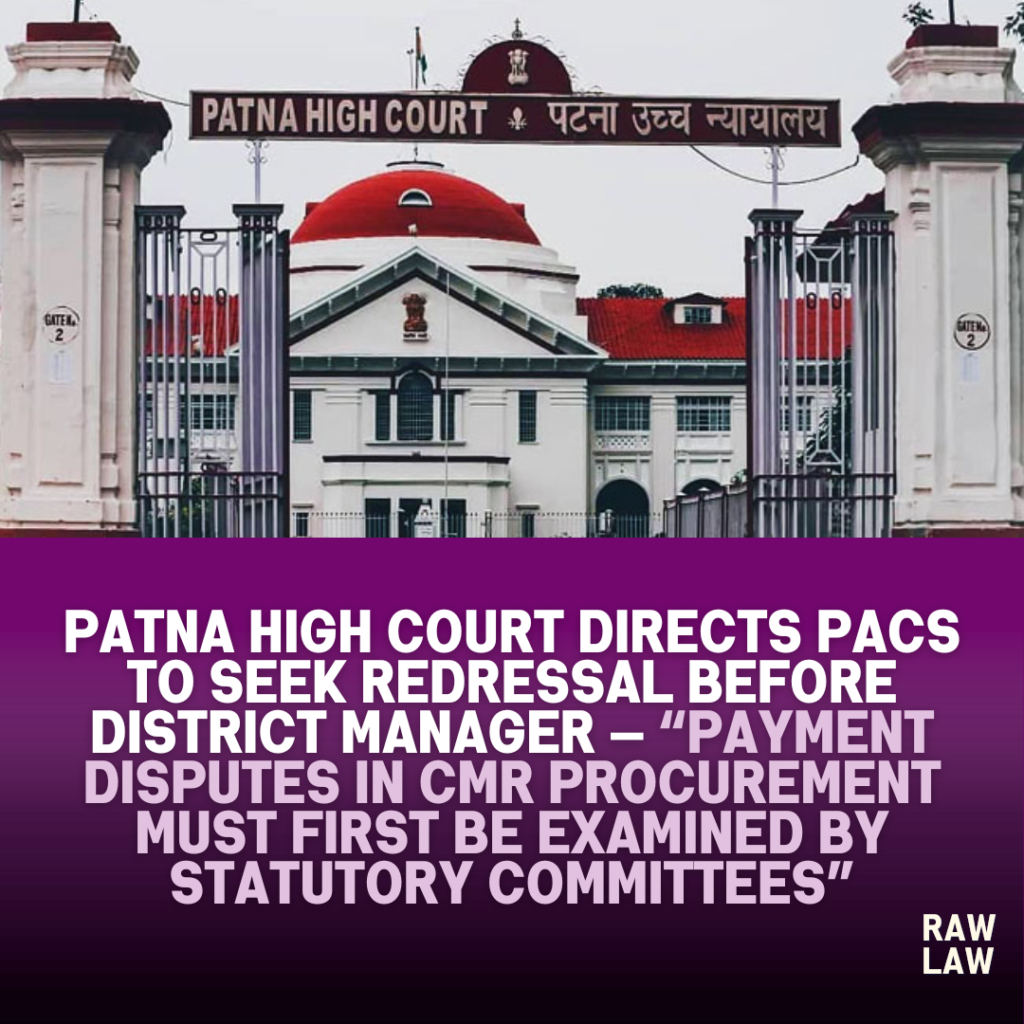Court’s Decision
The Patna High Court disposed of a writ petition filed by a Primary Agricultural Credit Society (PACS) seeking payment of ₹47,95,050.32 along with interest for Custom Milled Rice (CMR) supplied to the Bihar State Food and Civil Supplies Corporation (BSFC) during the 2016–17 procurement season. The Court, instead of issuing a direct mandamus for payment, directed the petitioners to approach the District Manager, BSFC, Nalanda, with a detailed representation supported by documents. The District Manager was ordered to decide the matter within three months, after considering the petitioner’s claim and following the earlier directions issued in LPA No. 881 of 2016
.
Facts
The petitioners, representing PACS in Nalanda district, supplied CMR to the BSFC under the State procurement scheme for 2016–17. Despite completing the supply, payment amounting to ₹47,95,050.32 remained unpaid. The petitioners also faced additional financial burden as interest accrued on cash credit loans taken from the Nalanda District Central Co-operative Bank for procurement operations.
Aggrieved by the non-payment, the petitioners approached the High Court, seeking a writ of mandamus directing BSFC and State authorities to clear the dues with applicable interest. They also relied on earlier judgments where similar disputes had been adjudicated in favour of PACS.
Issues
- Whether the High Court should issue a direct order for payment of dues to the petitioning PACS.
- Whether disputes regarding procurement payments fall within the jurisdiction of BSFC and require prior consideration by designated committees.
- Whether reliance on earlier judgments such as LPA No. 881 of 2016 justifies directing authorities to constitute a committee for redressal.
Petitioner’s Arguments
The petitioners argued that they had duly supplied CMR to BSFC as per the procurement scheme but were denied timely payment. They claimed that BSFC’s delay caused not only financial hardship but also liability towards interest charged by the Co-operative Bank against the cash credit used for procurement.
They further contended that their case was squarely covered by the High Court’s earlier judgment dated 01.12.2023 in CWJC No. 14138 of 2015 (Amrendra Kumar v. State of Bihar), which had directed payment of dues to similarly placed PACS. They therefore sought identical relief.
Respondent’s Arguments
The respondents, including BSFC, argued that disputes relating to CMR procurement must be examined by the competent authority with the assistance of committees constituted in terms of LPA No. 881 of 2016. They submitted that the High Court should not directly order payment without first directing an inquiry by the District Manager and the designated committee.
They maintained that while PACS may be entitled to legitimate dues, such entitlement had to be verified through examination of procurement records, delivery challans, and accounts before disbursal.
Analysis of the Law
The Court examined the statutory procurement framework under which PACS supply CMR to BSFC. It noted that while PACS play a crucial role in procurement operations, the mechanism for payment disputes lies with BSFC and designated committees formed as per judicial directives.
The Court referred to:
- CWJC No. 14138 of 2015 (Amrendra Kumar v. State of Bihar) — where PACS were directed to approach BSFC for release of dues, and the Court protected their claims.
- LPA No. 881 of 2016 (BSFC v. Nayan Kumar Sinha & Ors.) — where a Division Bench directed constitution of a three-member committee (District Magistrate, Block Enforcement Officer, and a senior BSFC officer) to examine such disputes.
These decisions established that while PACS may legitimately claim dues, the High Court’s role was limited to ensuring fair adjudication through statutory committees, not issuing direct mandamus for payment.
Precedent Analysis
The Court reiterated the binding nature of LPA No. 881 of 2016, which laid down that all procurement-related disputes must first be scrutinised by a committee before payments are ordered. It also noted that subsequent cases such as Amrendra Kumar had applied this principle consistently.
By applying these precedents, the Court emphasised judicial consistency and procedural fairness, ensuring that disputes are resolved at the proper forum before invoking writ jurisdiction.
Court’s Reasoning
The Court reasoned that the petitioners’ case was squarely covered by earlier decisions and that the proper course was to approach the District Manager of BSFC, Nalanda, with supporting documents. The District Manager, in turn, was required to either decide the matter directly or constitute the committee as per LPA No. 881 of 2016.
The Court underscored that High Court intervention is limited to directing the statutory mechanism to function effectively and that writ jurisdiction is not meant to bypass established processes.
Conclusion
The writ petition was disposed of with directions to the petitioners to file a representation before the District Manager, BSFC, Nalanda within four weeks. The District Manager was instructed to consider the claim, consult the designated committee if necessary, and pass a reasoned order within three months. Any order passed was to be communicated to the petitioners.
Implications
This judgment strengthens procedural discipline in resolving procurement payment disputes. It reassures PACS that their claims will be considered through statutory committees, while also protecting BSFC from being compelled to release payments without verification. The ruling balances the financial interests of PACS with the accountability requirements of BSFC.
For future disputes, PACS must exhaust the remedy of approaching BSFC and its designated committees before invoking writ jurisdiction.
FAQs
Q1. Can PACS directly seek High Court intervention for non-payment of CMR dues?
No. The Court held that disputes must first be addressed before BSFC and the committee constituted as per LPA No. 881 of 2016.
Q2. What is the role of the committee under LPA No. 881 of 2016?
The three-member committee examines procurement records, verifies claims, and submits a report to the District Manager before payments are approved.
Q3. How soon must BSFC decide PACS claims after representation?
The Court directed that claims must be decided within three months of filing representation, ensuring time-bound redressal.
